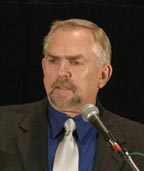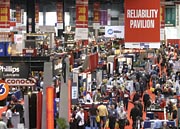Newswatch: Manufacturing Show Opens With Rally to Save American Jobs

One celebrity at the rally was John Ratzenberger. Probably best known as Cliff Clavin, the mailman in the "Cheers" television series, he currently is host of the Discovery Channel's "Made in America" series on American-made products. Ratzenberger gave a passionate speech about growing up around manufacturing in Bridgeport, CT, and manufacturing's importance to the country.
"Bridgeport was once the jewel in the crown of the industrial Northeast," Ratzenberger said. "I was raised with the idea that Americans were inventors and problem solvers. Our parents made things, and they took pride in what they made."
He said the loss of factories is too high of a cost to pay for low-priced, foreign-produced goods. "Each lost factory is a death in the family. They're our treasures, our national heritage. No Chinese company is going to sponsor the local little league team."
"The America I knew hardly exists anymore," Ratzenberger lamented, adding that he didn't want to go back to some idyllic past, but he did want the United States to have a strong manufacturing base.
The job losses in manufacturing, he said, don't bode well for the middle class in this country. "Manufacturing is the canary in the coal mine," he said. "Please, let's stop the hemorrhaging."
U.S. Rep. Dan Manzullo (R-IL), chairman of the House Small Business Committee and an advocate for manufacturing on Capitol Hill, discussed the problems facing U.S. manufacturers and outlined steps the United States should take to save jobs.
"The U.S. manufacturing sector has endured 42 consecutive months of steep job losses, putting more than 2.8 million hard-working Americans in the unemployment lines," Manzullo said. "Thousands of companies-some vital to our national defense-have closed for good."
He especially noted the importance of small to medium-sized manufacturers. They employ half of all manufacturing workers, pay their workers 20% more than similar-sized businesses and account for the vast majority of the basic products and inputs essential to national security, he said.
He also noted a number of factors working against U.S. manufacturers. Among them are Washington's "cluelessness" about the importance of manufacturing; the surging cost of insurance of all kinds, particularly health insurance; a "suffocating" tax burden; inaccessibility of capital; and foreign and domestic trade barriers.
The first part of his plan to restore manufacturing here is to end foreign currency manipulation. "Economists estimate that manufacturers in China enjoy a 15 to 40% cost advantage over U.S. goods and services because of unfair manipulation," he said.
Second, he encouraged tax relief for domestic manufacturers. He noted that, under WTO order, the federal government must repeal and replace a troubled tax program that provides $5 billion in tax relief for U.S. exporters each year. He also wants to cut tax incentives that encourage multinational corporations to move more production overseas.

A fourth proposal involves measures to curb rising healthcare costs, which, Manzullo said, are rising 20 to 40% per year for small businesses, and causing many small businesses to drop healthcare coverage for workers. The initiatives include enabling small businesses to pool interests in negotiations with providers, and reforms in medical malpractice and litigation.
Some of the most chilling remarks came from economist Ronald Pollina, president of Pollina Corporate Real Estate in Chicago. "High-tech jobs are also fleeing the country at an alarming rate," he said.
One reason, for example, is that India produces nearly 300,000 engineering graduates each year, many of whom graduate from universities thought superior to counterparts in the United States. And a typical computer programmer might be paid only $10,000 per year in India.
"Increasing numbers of highly skilled and highly paid jobs are moving abroad," Pollina said. "These are exactly the types of jobs U.S. workers thought would always remain theirs."
The management accounting firm A.T. Kearney expects that more than 500,000 jobs in the financial services industry will be relocated over the next five years, with India being the major recipient, Pollina said. Forrester Research estimates that 200,000 white collar jobs in engineering, programming and accounting will leave the U.S. each year, he added.
"With so many business and high-tech jobs being sent offshore, where will the future U.S. business leaders come from?" Pollina asked.
Richard LaPointe, deputy assistant secretary for the Office of Vocational and Adult Education in the U.S. Department. of Education, made a similar point about the loss of skilled jobs. One of his colleagues talked with a CPA who told her his company saves money by faxing tax returns to India every night. "The next morning, they are returned, and he finds they are done at a higher level of accuracy than when his own company does them."
"American firms are not going [overseas] just for cheap labor, they are going there for skilled labor," LaPointe said. "That's the startling new reality we face. If we lose both the low-skilled jobs and the high-skilled jobs, what will be left for Americans?"
One problem, LaPointe points out, is that four of five U.S. high school graduates are not proficient in math or science. "We are now faced with two urgent imperatives," he said. "First, every child deserves, as an absolutely unquestioned right, the best education that this country is capable of providing. Second, if children are left behind, then nations will be left behind."
LaPointe said the federal government is working to develop programs to remedy the situation. "The ‘No Child Left Behind' legislation makes rigor, high standards, required assessments and accountability the absolute backbone of educational reform in this country," he said.
LaPointe said the government is also doing more to create innovative programs that bridge the gap between academic instruction and the needs of a real-world economy. Additionally, new initiatives are connecting educators with policy makers to discuss innovative methods to transform high schools into more efficient institutions of learning.
"We look upon the global developments I have alluded to as an incentive, a provocation, that can benefit us all," LaPointe said. "In the new global economy, we must struggle as never before to be full participants. We must be committed, in the words of Teddy Roosevelt, to ‘a life of strenuous endeavor.' We must be prepared to ask more of our children, our teachers and ourselves. In doing so, we will doubtless discover, as we have in prior times of challenge, the best that is in us."
Looking for a reprint of this article?
From high-res PDFs to custom plaques, order your copy today!



